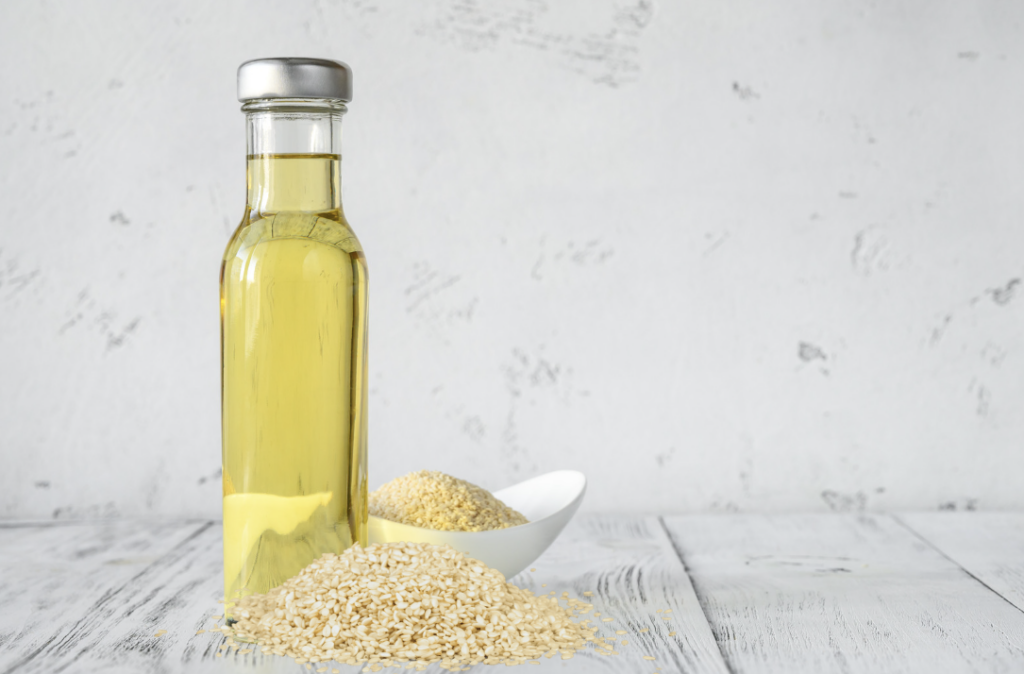What to Eat and Drink
Unleash the Potential of Sesame Oil for a Healthier You
If you’re looking for healthier cooking oils, sesame oil should surely be on your list. This golden oil, which is packed with several health advantages, has been utilized in Asian cuisine and traditional medicine for hundreds of years. Sesame oil, which is high in antioxidants and noted for its characteristic nutty flavor, provides a distinct taste as well as a variety of possible health benefits. In fact, it has been linked to better heart health, less inflammation, and healthier skin.
What a win-win for your overall health! Sesame oil offers a tasty and nutritious flavor to any recipe, whether it’s stir-fried veggies or mixed into salad dressings. However, it is vital to remember that moderation is essential, since excessive usage may not deliver advantages and may result in unpleasant side effects. So, add a sprinkle of sesame oil to your meals and enjoy the incredible flavors and health benefits it has to offer.
Nutritional Benefits of Sesame Oil
Sesame oil is tasty and nutritious. It contains critical fatty acids such as omega-6 and omega-9, which are necessary for proper heart and brain function. Sesame oil also includes vitamin E, a potent antioxidant that protects the body’s cells from harm caused by free radicals. This oil also contains phytosterols, which have been demonstrated to lower cholesterol and lessen the risk of heart disease. Furthermore, sesame oil contains minerals such as calcium, iron, and magnesium, which are necessary for strong bones and a healthy immune system.
Sesame oil has a rather high calorie count due to its fat content. However, due to its intense flavor, a small amount goes a long way. You may reap the nutritional benefits of sesame oil without adding too many calories to your diet by using it in moderation.

Health Benefits of Consuming Sesame Oil
Sesame oil is not only a tasty complement to your meals, but it also has several health benefits. Let’s look at some of the ways sesame oil can improve your health.
Heart Health
Heart disease is the biggest cause of mortality worldwide, and keeping your heart healthy is critical for general well-being. Sesame oil has been demonstrated to have a favorable effect on cardiovascular health. It contains sesamol, an antioxidant and anti-inflammatory substance that promotes heart health. Sesame oil also includes monounsaturated fats, which can help lower bad cholesterol and lower the risk of cardiovascular disease. Also Sesame oil contains phytosterols, which can help manage cholesterol levels and limit cholesterol absorption in the stomach.
Skin Health
In addition to its culinary use, sesame oil has long been utilized in traditional medicine to help the skin. It contains many antioxidants, including vitamin E, which can help protect the skin from free radical damage. Sesame oil also includes fatty acids, which hydrate and nourish the skin, making it soft and supple. Furthermore, sesame oil has antimicrobial qualities that can help combat acne-causing bacteria and reduce inflammation. Regularly massaging sesame oil onto the skin can help to maintain a healthy complexion and decrease the appearance of fine lines and wrinkles.
Hair Health
Sesame oil is beneficial to both the skin and the hair. Its nourishing characteristics can assist to strengthen hair follicles, prevent breakage, and promote healthy hair development. Sesame oil includes vitamin E, which increases blood circulation to the scalp and nourishes the hair follicles. It also has antimicrobial characteristics, which can help treat scalp infections and dandruff. Regularly massaging sesame oil into your scalp and hair helps enhance its condition, making it bright and lustrous.

Cooking with Sesame Oil
Sesame oil is a versatile oil that may be utilized in a wide range of cooking styles and cultures. Its characteristic nutty flavor lends depth and richness to recipes, making it a prominent ingredient in Asian cuisine. Here are a few ways to use sesame oil in your cooking:
- Stir-frying: Sesame oil is perfect for stir-frying vegetables, meat, or tofu. Its high smoke point makes it suitable for high-temperature cooking, and its flavor adds a delicious twist to your stir-fry dishes.
- Marinades and dressings: Add a drizzle of sesame oil to your marinades and dressings for a burst of flavor. It pairs well with soy sauce, ginger, garlic, and citrus, creating a tasty and aromatic combination.
- Dipping sauce: Mix sesame oil with soy sauce, rice vinegar, and a touch of honey for a simple and flavorful dipping sauce for dumplings, spring rolls, or sushi.
- Finishing touch: Drizzle a little bit of sesame oil over cooked dishes just before serving to enhance the flavors and add a final touch of nuttiness.
Different Types of Sesame Oil
There are different types of sesame oil available, each with its own unique characteristics. The most common types are:
- Toasted sesame oil: This type of sesame oil is made from roasted sesame seeds, giving it a deep, rich flavor and a dark color. It is commonly used as a finishing oil or for adding flavor to dishes.
- Light sesame oil: This variety is made from raw sesame seeds and has a lighter color and milder flavor compared to toasted sesame oil. It is suitable for cooking at higher temperatures and can be used in a wide range of dishes.
- Cold-pressed sesame oil: This type of sesame oil is extracted without the use of heat, which helps retain the oil’s natural flavors and nutrients. It has a lighter color and a delicate, nutty flavor, making it a popular choice for dressings and marinades.

Incorporating Sesame Oil into Your Diet
Now that you know about the nutritional and health benefits of sesame oil, you may be wondering how to incorporate it into your diet. Here are some ideas to get you started:
- Salad dressings: Mix sesame oil with vinegar, soy sauce, and a touch of honey for a flavorful salad dressing.
- Stir-fries: Use sesame oil as the base oil for stir-frying vegetables, meat, or tofu. Its nutty flavor will enhance the overall taste of the dish.
- Marinades: Combine sesame oil with soy sauce, ginger, garlic, and your choice of herbs and spices to create a delicious marinade for meat or tofu.
- Dips and sauces: Mix sesame oil with soy sauce, rice vinegar, and other seasonings for a tasty dipping sauce or marinade for grilled meats.
Remember, moderation is key when consuming sesame oil. While it offers numerous health benefits, excessive consumption may not provide additional benefits and could lead to unwanted side effects.
Conclusion
In my opinion, sesame oil is undeniably good for you. Brimming with nutritional benefits, it has the potential to boost heart health, enhance skin and hair health, all while imparting a delightful flavor to your dishes. Whether I’m stir-frying vegetables, marinating meat, or whipping up a salad dressing, sesame oil has become a staple in my kitchen, offering versatility and a health-conscious touch to my culinary repertoire. The key, of course, is to use it in moderation to fully relish its benefits. So, I encourage you to unlock the amazing flavors and health perks of sesame oil, and take your cooking to new and delicious heights!
Trusted Health, Wellness, and Medical advice for your well-being


